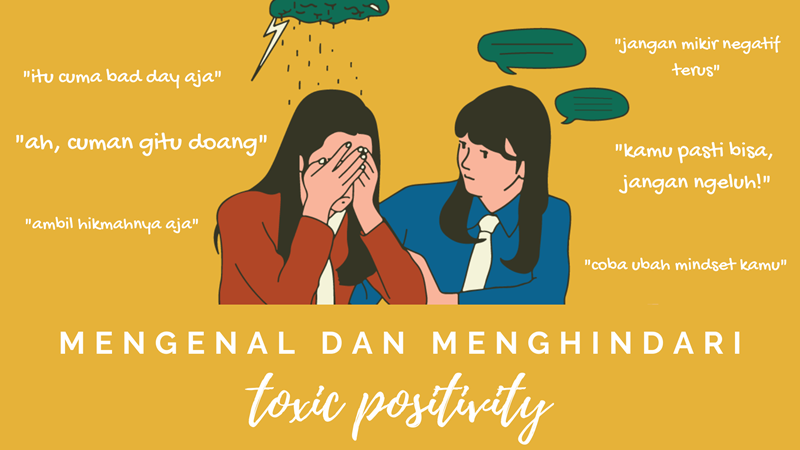In the midst of the onslaught of the culture of motivation and the spirit of “stay positive” which is increasingly rooted in modern society, we are faced with phenomena that at a glance appear to be constructive but actually damage slowly, namely Poisonous positive. This term refers to excessive encouragement to think positively in all situations, including when someone is experiencing sadness, anger, or frustration. Although positive thinking is a healthy habit and can help someone face challenges, but when done extreme to reject the reality of negative emotions, this can actually be dangerous.
In general, toxic positivity appears in the form of cliché comments like “all there must be wisdom”, “Don’t keep sad, can be opposed”, or “there are still many who suffer more than you”. These sentences do sound good, but if it is said at an inappropriate time or without empathy, it can backfire. Instead of helping, they instead pressed individuals to refuse or cover their true emotions.
Also read: Trapped in Toxic Friendship
One concrete example came from a viral case at the beginning of Pandemi Covid-19. A young nurse in Jakarta had shared his story on social media about how hard it was to work in the front guard with a hot and overtime personal protective equipment. Instead of getting empathy, he actually received many comments that blame his feelings, “You should be grateful to still have a job”, or “Don’t complain, you are a hero”. This nurse finally chose to close her account because of the psychological pressure she received. The comments seemed positive, but actually denying his emotions and traumatic experiences. This is a form of toxic positivity that is often unconscious.
This phenomenon is strengthened by social media culture, where people tend to only share the positive side of their lives. Uploads about achievement, happiness, and self -motivation make us think that feeling sad or tired is a sign of weakness. Unconsciously, people create fake standards that happiness is the only emotions that are socially accepted. The people who were struggling finally felt guilty because they were not “strong enough” to keep smiling.

It is important to understand that negative emotions are a natural part of human life. Angry, sad, disappointed, frustrated – all have important psychological functions. They are a signal that there is something that needs attention or resolved. Forcing yourself to be happy all the time can actually cause mental health problems such as anxiety, depression, and even emotional fatigue.
Of course, this does not mean we must justify pessimism or allow negative emotions to control us fully. Balance is key. We need to create space to acknowledge negative emotions without fear of being judged, and at the same time build self -resilience so as not to get caught up too long in sadness. This is where the importance of the role of society to create empathy ecosystems, not just motivation.
Tackling Toxic Positivity requires collective awareness. First, we need to learn to be a good listener. When someone vent, we don’t have to immediately offer solutions or encouragement. Sometimes, enough to say, “I understand you feel like that. That’s natural.” Things as simple as that can be very soothing. We must let people feel their emotions completely before suggesting improved steps.
Second, it is important to reflect the sentences that we say to others and ourselves. Does the words help, or even suppress valid emotions? For example, instead of saying “don’t be sad”, we can say “I know this is sad, and it’s okay to feel like that.”
Also read: Overcoming Toxic Parenting
Third, we need to realize that being positive does not mean rejecting reality. A healthy positivity is to accept emotions as a whole and still believe that the situation can improve – not by denying the problem, but by dealing with it.
Another case that describes the impact of toxic positivity occurs among students. In a study conducted at the University of Indonesia in 2022, it was found that some students felt reluctant to consult with campus counselors for fear of being considered weak or “not grateful”. Because, the dominant narrative around them is: “You are smart, you can definitely overcome it yourself”, or “Don’t be spoiled, everyone is also tired.” In fact, requests for help are not a sign of weakness, but the courage to care for yourself.
Not to be a suspect Poisonous positiveWe need to prioritize empathy and prioritize listening rather than giving advice. Meanwhile, not to become victims, we need to learn to recognize the limits of our own emotions, and free ourselves from the pressure to always appear “fine”. Therapy, journaling, or even honest conversations with friends who are believed to be a healthy first step.
In the end, emotionally healthy does not mean always positive, but able to recognize, accept, and manage emotions that arise, good and bad. Because it is precisely in honesty to receive wounds, we find a path to a whole recovery. Positivity is important, but don’t ignore the reality being faced. The world is not always bright, and that’s okay. The important thing is, we don’t walk alone.
Writer: trough
Editor: Rara Zaryry
Game Center
Game News
Review Film
Rumus Matematika
Anime Batch
Berita Terkini
Berita Terkini
Berita Terkini
Berita Terkini
review anime
